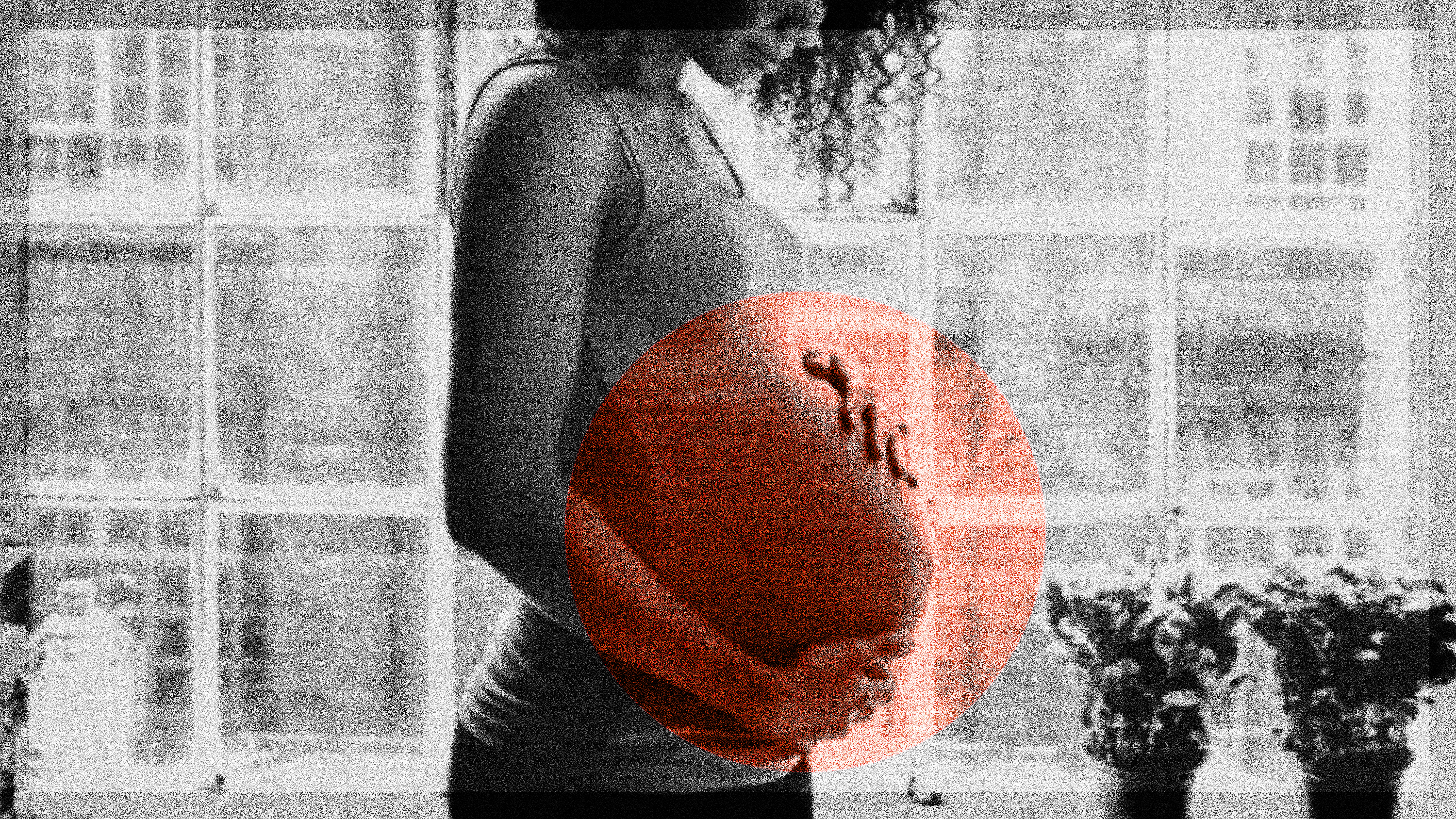
I usually look forward to work trips with an excitement bordering on giddiness. Several nights in a hotel room without children, falling asleep alone watching a bad movie on cable is a middle-aged mother’s dream.
And yet I’m dreading my work trip next month. Maybe dread isn’t strong enough. I’m terrified to go on this reporting road trip through South Dakota and Wisconsin at a time when I’ll be 18 weeks pregnant with my third child at the age of 41.
It’s a high-risk surprise pregnancy, the kind doctors in our very eloquent and woman-loving country refer to as “geriatric” due to the fact that I am over the age of 35. So far everything—all of the tests and scans and voodoo that happens in early pregnancy—has been going well. I’ve been feeling good.
Until I stopped feeling good. Following Friday's Supreme Court decision striking down the constitutional right to abortion and triggering laws banning or severely restricting the procedure in at least 13 states, I began to feel whatever the opposite of good is. Nauseatingly horror-stricken and depleted of all joy, perhaps.
I am filled with fear for all women in this country right now, but also for myself, for my unborn baby, and for the two children under the age of 5 that I’m hoping to live a long time to take care of. A pregnancy at any age is anxiety-inducing enough. It’s even more anxiety-inducing at my age, when the risk of complications for both the mother and the fetus are much higher. I used to feel certain that if something went wrong during the course of this pregnancy, doctors at any hospital in the country would do whatever it takes to save my life. Now, I’m not so sure.
I’m not so sure that a doctor in South Dakota—where a trigger law made abortion a criminal act as of 9 a.m. Friday, June 24—would take every precaution to save my life in the terrible circumstances of a miscarriage if it meant losing their license or going to prison.
The law now in effect reads: "Any person who administers to any pregnant female or who prescribes or procures for any pregnant female any medicine, drug, or substance or uses or employs any instrument or other means with intent thereby to procure an abortion, unless there is appropriate and reasonable medical judgment that performance of an abortion is necessary to preserve the life of the pregnant female, is guilty of a Class 6 felony."
Get exclusive access to fashion and beauty trends, hot-off-the-press celebrity news, and more.
I used to feel certain that if something went wrong during the course of this pregnancy, doctors at any hospital in the country would do whatever it takes to save my life. Now, I’m not so sure.
The medical procedures that are often required to help a woman survive a later-term miscarriage (one in the second trimester of pregnancy, which I am squarely in) are very similar to the ones used in an abortion and are often classified the same way by billing codes. The abortion pill, Misoprostol, can be prescribed for miscarriage treatment to help a woman’s body expel remaining tissue, preventing infection. Dilation and curettage (D&C), a procedure to remove tissue from inside the uterus following an incomplete miscarriage, can also be performed to remove any remaining tissue from the uterus following an abortion. There is plenty of dangerous overlap in procedures and semantics that could force doctors to make difficult decisions or delay the onset of life-saving care as they consult lawyers.
This already happens in places where abortion is illegal or restricted. Earlier this month, an American woman on a babymoon in Malta was denied potentially life-saving treatment following an incomplete miscarriage at 16 weeks, which left her at risk for a fatal infection, because Malta—like many U.S. states now—bans abortion. She was airlifted to Mallorca, Spain, where she received treatment and was stabilized. Her husband gave a statement to the Associated Press following last week’s SCOTUS ruling: “We were just thinking about the women who are going to suffer in states where politicians will choose to do something like Malta for a political gain,” he told the AP. “Women are going to suffer.”
Physicians in some states have already refused to treat women in the midst of a miscarriage for fear of being charged with a criminal act. So, despite that last line of the new South Dakota law, “reasonable medical judgement that performance of an abortion is necessary to preserve the life of a pregnant female,” I don’t trust that a doctor will necessarily prioritize my life over their own livelihood and freedom. It is a valid fear.
Wisconsin’s statute now states, “Providing an abortion is now a felony punishable by up to six years in prison and a fine of up to $10,000.” There remains a clause in Wisconsin for the life of the mother as well, yet I still don’t want to be plunged into that gray area. No woman should be plunged into that gray area—to have to imagine begging for her life, her health, and the ability to continue to raise the two children she already brought into this world.
When I said this to my husband (who is from Wisconsin), he asked if I was possibly being dramatic. He’s very rational about things and often thinks I’m overreacting. I wavered for a moment. And then I read a statement given to the New York Times by Wisconsin State Senator Kelda Roys: “Every District Attorney in the state is going to be empowered to potentially investigate miscarriages to test the limits of the law and see if they can put doctors in prison. It makes things very difficult for healthcare providers.” No one is overreacting here.
I posted about my fear on Instagram over the weekend and received dozens of messages from pregnant women in states that have banned or restricted abortion access.
“Currently 33 weeks in Wisconsin and living in constant paralyzing fear.”
“Missouri - 15 weeks in and I’m back on the Zoloft I weaned myself off of to get pregnant because otherwise I’ll die of a panic attack thinking about what happens if I have a miscarriage.”
This issue is so much bigger than a philosophical game of deciding when a life does or does not begin. This is about saving the lives of women right now, about allowing doctors to make the decision to properly care for their patients without fear of prison or loss of their livelihood.
I’m a 41-year-old woman with two healthy children who wasn’t planning on having another. But when I got pregnant, it was a welcome surprise. In theory, the banning of abortions shouldn’t impact me. And yet, of course it does. It impacts all of us—not just human beings with a uterus, but everyone who knows and loves a person who could have her healthcare compromised in this terrifying new reality.
I’m still getting on a plane a few days to report for a podcast on the life and complicated legacy of Laura Ingalls Wilder—ironically a woman who also didn’t have much agency over her life or her body back in the 19th century. If I’ve learned anything being a mother two times over, it’s that you can’t live in fear of what could happen. Anything can happen when you choose to bring a human being into this world, and a lot of it will break your heart and your body. But I won’t be going without a contingency plan. I’ll always make sure I know where the closest hospital is across the nearest state border. My team will be briefed on where we can safely go in case of the worst happening. And I won’t fall into a blissful sleep watching Speed or How to Lose a Guy in 10 Days. Instead, I’ll be worried for the pregnant women laying awake in fear, women who don’t have the luxury that I do of simply going home to a state—Pennsylvania—that will protect my health and my body for the rest of my pregnancy so that I can continue being a mother to my children who are already in this world.
Jo Piazza is author of seven critically acclaimed books, both fiction and non-fiction which have been translated into more than ten languages, including her most recent, Charlotte Walsh Likes to Win.

